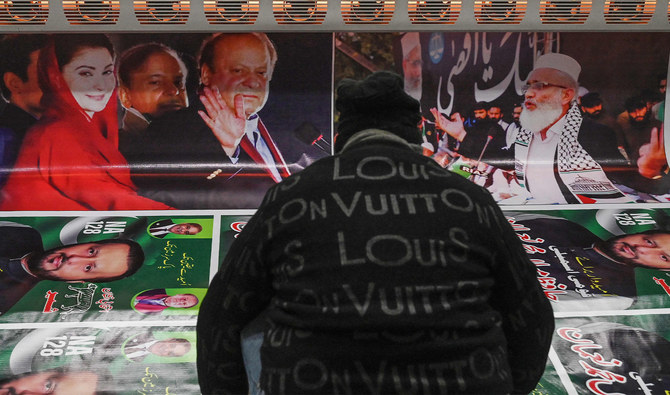ISLAMABAD: As Pakistan gears up for national elections on Feb, 8, first-time voters hope the much-delayed polls would lead to stability in the South Asian country after more than a year of political and economic chaos.
Pakistan, a country of over 241 million people, has witnessed political turmoil since the ouster of former prime minister Imran Khan in a parliamentary no-confidence vote in April 2022. Decades of financial mismanagement brought the country to the verge of a default in June 2023, which was averted by a last-gasp $3 billion financing from the International Monetary Fund (IMF).
Elections in the country were originally expected to take place in November after Pakistan’s national and two provincial assemblies were dissolved in August before reaching the end of their tenure. However, Pakistan’s election regulator decided to redraw hundreds of national and provincial constituencies based on a digital census carried out in April before arranging the electoral contest.
Pakistan is currently navigating a tricky path to economic recovery under a caretaker government in the wake of the IMF program and many believe the Feb. 8 elections will pave the way for further stability in the South Asian country.
“We have no other power, the vote is my power,” Hashmat Ali, a 21-year-old employee of a security company in Peshawar, told Arab News last week. “I expect after the election the country’s situation would become normal and the inflation would be controlled.”
Ali said he would vote for Khan’s Pakistan Tehreek-e-Insaf (PTI) party in the upcoming elections.
Hassan Ali Butt, a 23-year-old student of journalism who lives in Quetta, said he would be voting for the first time in the upcoming elections and he preferred the Pakistan Peoples Party (PPP) over others.
“This is my first time. I am hopeful of voting for the Pakistan Peoples Party because the party is being headed by young Bilawal Bhutto Zardari,” he said.
A ballot holds significant power and it can put the country on the path of development as well push it into turmoil if not used wisely, according to Butt.
“Indeed, with the power of vote, either we can push the country on a development track or push it into turmoil,” he told Arab News in Quetta. “But the power remains in the hands of the public who they want to elect and who they want to keep aside.”
In the Pakistani capital of Islamabad, Shanza Khan, a 23-year-old dentist, said she would be polling her vote in favor of Khan-led PTI as its government supported the masses through various social welfare initiatives, including health cards.
“During Imran Khan’s government, people were in a much better condition than right now. Like, for example, the health card used to work in all hospitals, including ours, and people were getting a lot of benefits from it,” she said.
“Now that’s not available anymore. Or people are just confused about it because it doesn’t work in so many places. Also, the inflation has increased so much and the condition that our economy is in right now.”
Shanza, however, did not expect the election to be fair.
“I don’t think it’s fair at all,” she told Arab News. “They have been arresting people illegally, they have been abducting people, they are harassing people.”
Khan’s PTI party has been at the receiving end of a crackdown by authorities since May last year, when its supporters staged violent demonstrations in the country over Khan’s brief detention in a graft case. The crackdown saw several senior figures defect, be arrested or driven underground.
The ex-premier, who denies any wrongdoing and says the charges against him are “politically motivated,” has accused Pakistan’s powerful military, the caretaker government and his political rivals of colluding to keep him and his party away from elections. All three deny the allegation.
Abubaker Saeed, a 22-year-old student in Islamabad, said he would be voting for three-time former prime minister Nawaz Sharif’s Pakistan Muslim League-Nawaz (PML-N) party.
“I personally feel that Nawaz Sharif can handle the country well,” Saeed opined. “He was in power three times before, so he has more experience and we have also seen that during his time the country was booming, the economy was very strong. So, I think he can handle this country better.”
But Saeed too had doubts about the transparency of the elections.
“Absolutely not, I don’t think that the electoral process is fair at all,” he said. “Even in the previous elections, we observed that the results were pre-decided and not fair at all.”
In Pakistan’s largest city of Karachi, first-time voters said the nation needed to understand the significance of a ballot, which could change everything.
“In my opinion, one vote can bring about a significant change,” Areeba Gul Muhammad Shahzad, a 19-year-old student, told Arab News. “If the nation understands its importance, a lot can happen. One vote can change everything.”












